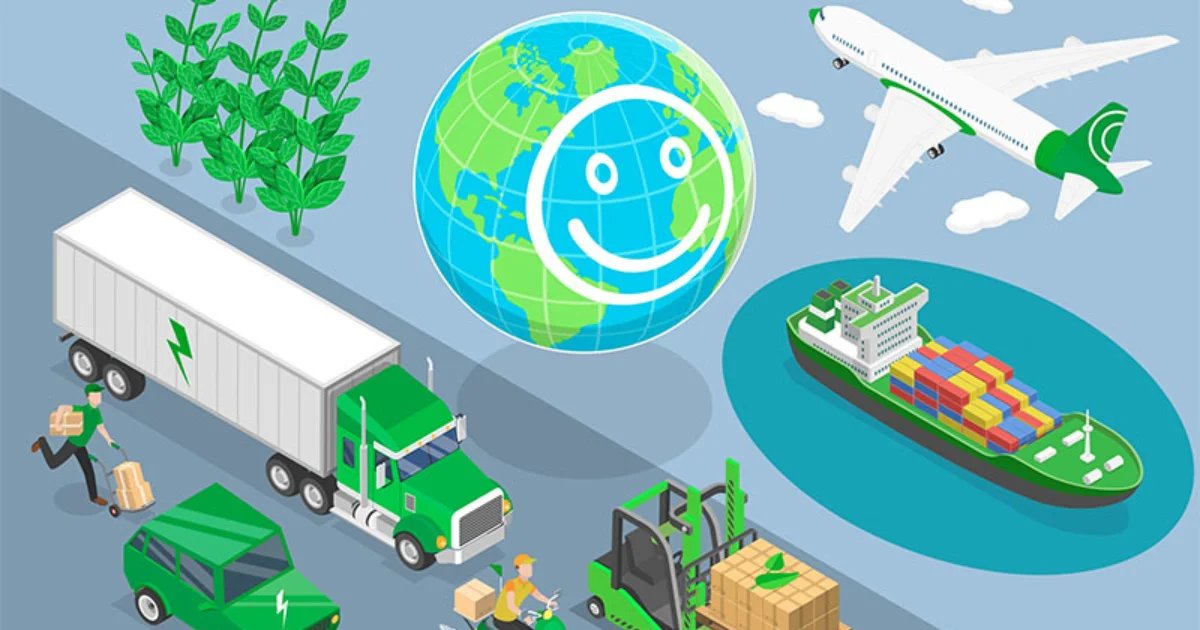The trend towards sustainability is driving a transformational change in the way logistics and freight transport are practiced in the world of international commerce. The industry is veering closer and closer toward green logistics, which is more friendly to the environment, thus reducing the carbon footprint and also featuring in economic gain through efficiency enhancement.
Definition of Green Logistics: Meaning on the Industry
Green logistics involves a wide range of practices that are adopted to reduce environmental impacts in logistics and supply chain operations. This indeed sums up a really extensive list of practices, including reduction of emissions, energy conservation, resource use optimization, and proper waste management.
To further boost the efficiency of your business within this evolving landscape, consider leveraging the capabilities of the Haulk app. This advanced carrier software is designed to optimize your workflow, transport management, and dispatch management, integrating full CRM capabilities with an intuitive mobile platform.
Carriers using the Haulk app can easily track order fulfillment, monitor shipment progress, and evaluate employee performance, ensuring top-notch operational control. The latest version of the Haulk app also enhances load, delivery, vehicle, and cargo management, making it an indispensable tool for businesses aiming to thrive in the competitive field of green logistics.
More information: https://haulk.app/carriers.
Importance and Current Practices of Sustainable Freight Transport
With burgeoning world trade and tightening environmental regulations, the freight transport sector is increasingly put under pressure to green its practices. More and more consumers and businesses take green issues into account in their choices, and stakeholders are relying on green logistics solutions to assure them that products will be delivered not only efficiently but also sustainably.
Also Read: How Gas Cylinders Are Transforming Our Lives Unobtrusively
Sustainable Innovative Technologies in Freight Transport
Electric and Hydro-Cell Vehicles: The Transport Revolution
Among all, the development that is having a critical impact on green logistics is in the area of electric and hydrogen fuel cell vehicles. The technology offers a cleaner alternative with regard to traditional diesel fuel-driven trucks, greatly reducing the emission of greenhouse gases. Most logistics companies are currently investing in the purchase of vehicles to future-proof their fleet against the stringent environmental laws that are on the way.
Technological Innovations in Biofuel and its Adoption in Logistics
Biofuels are another key area of innovation; they offer a renewable source of energy and have the potential to be used by most vehicle engines in place now, with at most some minor adjustments. As technologies in biofuel production continue to improve, the applications in logistics will be wider, which then tend to reduce their reliance on fossil fuels.
Strategies for Implementing Sustainable Logistics
Route planning and load management optimization
In fact, greening logistics is the underlying approach toward the use of modern software tools in route planning optimization and load management. For instance, with modern software tools, it is possible to make the mileage and fuel consumption reduction more effective, as the routes of delivery are optimized and the capacity of the cargo space is fully maximized. In the end, this reduces the general environmental burden.
Introduce Eco-friendly Packaging and Material Use
Sustainable logistics is also getting into the use of packaging materials that are biodegradable or can be recycled. Companies are looking into innovative packaging solutions that will not compromise with waste or pollution, yet protect the products from damage during transportation.
Problems and Prospects of Green Logistics Adoption
Overcoming Economic and Technological Hurdles
Obviously, such an adoption has environmental and long-term economic benefits, though the initial capital outlay in adopting green technologies can be very high. However, with the passage of time and the effect of technological development, coupled with economies of scale, it is expected that the cost of sustainable solutions will decrease, hence becoming within reach for the participants in the industry.
Potential Impact on Regulation and Incentives
The governments are moving towards green logistics by developing regulations and incentives—a move towards implementation. These practices can come in the way of tax breaks to the companies practicing green logistics or penalizing the companies that do not meet the specified standards of the environment. Such actions are expected to hasten the adoption of sustainable practices in freight transport.
Must Read: Supply Chain Risks and How to Mitigate Them
Frequently Asked Questions and Answers
Green logistics significantly reduce emissions, conserve energy, reduce waste, and underline the reusability and usage of renewable resources on a healthy planet.
Environmental performance indicators, carbon footprint analysis, and sustainability audits could assist in providing proof to quantify the beneficial effect of such green logistics on the companies.
For example, the leading ones are DHL and UPS, which provide new green logistics innovations in the utilization of electric transport, route optimization, and even the usage of sustainable solutions for packaging.
There are several standards and certifications, such as ISO 14001 for the management of the environment, which guide companies in the practices of sustainable logistics.
Also, future technologies encompass autonomous electric vehicles, advanced biofuels, and AI-driven logistics management systems that take further optimization of energy use and emissions into another scope.
In essence, green logistics innovation and sustainability are drivers toward the future of freight transport in general, placing it at the heart of success in moving toward a more sustainable global economy.
Harry O’Neill writes about all things tech, SaaS, and marketing at Solution Suggest. He’s known for turning complex ideas into clear, actionable insights. With experience working alongside top-tier companies worldwide, he helps brands connect with their audiences through content that drives real results.





















